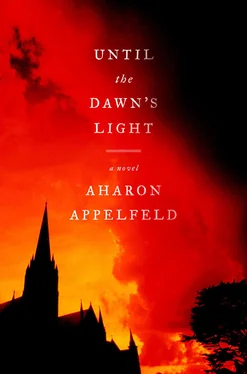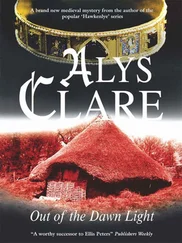Aharon Appelfeld
Until the Dawn's Light
THEY MOVED FROM train to train, sped past little stations, stopped at level crossings, and set out again with a rush across broad, flat expanses. It all transpired quickly and with frightening precision, as though they were no longer their own masters but in the hands of the railways, which treated them mercifully and moved them from place to place, almost without pain.
Otto was already four, and his mother regarded him as a big boy. She spoke to him and explained things to him that he certainly couldn’t understand. Her long and convoluted sentences perplexed him, but Blanca was sure he grasped her intention, and she would go on and burden him with more words. True, Otto asked pertinent questions, not because he understood what was happening, but because he was frightfully logical. Blanca, who was proud of his consistent thinking, was afraid now that he would trip her up. To distract him, she told him about things that never were, toyed with his limited memory, and promised him that before long they would get to a magical place.
“Where are we going, Mama?” he kept asking.
“To the north.”
“Is it far from here?”
“Not very.”
“Is the north in the country or in the city?”
“The north is up above, my dear.”
In her heart she knew she mustn’t lie; the boy was sensitive to contradictions. Still, she deceived him, distracted him, and concealed information. Even worse: she made him promises she couldn’t keep. Thus she became the accomplice of the speeding trains: together they confused him.
After a week of displacements, Otto stopped pestering her. He slept and barely poked his head out of his coat. Blanca was upset: perhaps his dreams were showing him what she wanted to keep from his sight. She thought that despite her efforts he had figured something out, and that the dream would turn his guess into a certainty — the thought disturbed her. She buried her face in her hands, the way her mother had done when headaches assailed her.
Otto sank ever deeper into sleep, and his face was relaxed. What she would do, and where the trains would lead them, Blanca still didn’t know. The summer light was full. The sky was blue, and the fields were yellow and spread out over the low hills. The bright view brought to mind the long vacations she had taken with her parents. They were so far away now, it was as if those vacations had never taken place.
When Otto woke from his sleep he was pale, and he immediately started vomiting. In his infancy he used to vomit, but since then he hadn’t complained about stomachaches or vomited. Now he shuddered in her arms as if fleeing from a nightmare.
“We’ll get off here,” said Blanca, and they got off right away.
It was a small village, with wooden houses scattered amid greenery.
“This is it,” she said, as if they had reached a safe haven.
“And there’s a river here, Mama.” Otto opened his eyes wide.
“I assume so, dear,” she guessed, not knowing if she was right. Not far from the station the famous Dessel River flowed energetically. Its clear, gushing waters were well-known.
“Mama!” Otto shouted in astonishment.
“What?”
“Let’s go rowing on the river.”
The word “river,” which Otto pronounced very sweetly, moved her, and she hugged him and kissed him on the forehead. A house for rent was easily found, a little wooden house overlooking the river, wrapped in vines and willows, far from the main road. Inside, darkness reigned, and dried herbs perfumed the air. The landlady, a pleasant-looking elderly woman, said, “Enjoy yourselves. This was my house once. Since my husband’s death, I’ve been living with my daughter.”
“When did your husband die?” Blanca asked.
“Two years ago. At the end of June it will be two years.”
“I’m sorry.”
“That’s how it is. What can I do?”
After showing them the secrets of the house, the old woman asked, “And where are you from?”
“From Vienna,” Blanca lied.
“God Almighty,” said the woman. “All during my youth I wanted to go to Vienna.”
“And you never got there?”
“Just once, for an operation.”
“Happiness doesn’t dwell where we imagine it.” Blanca repeated what her mother used to say.
“How true,” said the old woman, and she turned to go. She had cultivated a vegetable garden next to the house, and she placed it, too, at her tenants’ disposal.
“You can pick to your heart’s content.”
“Thank you,” said Blanca. She was so moved that she hugged the old woman.
Thus the dizziness was halted for a moment. They got up early, ate breakfast, and went down to the river. The river, they found, actually didn’t rush. It flowed, slow and clear, and carp swam lazily at the bottom, as though to avoid the danger awaiting them up above. Blanca and Otto swam together for hours, sometimes until sunset. Blanca, finding she could easily buy dairy products from the neighbors, filled the pantry with good food, and at night they would split open a watermelon, sitting and chatting until Otto collapsed on the mat and fell asleep.
But, finally, the blow fell.
“Mama!”
“What?”
“Where’s Papa?”
True, she had expected it, but her tongue cleaved to her palate. Why are you pestering me? she almost said. But she quickly recovered and murmured, “He’ll surely come.”
“Here?”
“I’m doubtful that he’ll come here, though.”
“What’s ‘doubtful’?”
“It’s a promise, dear.”
Otto’s sensitivity to words always scared her. Other children, she had noticed, also asked the meaning of a word, but Otto’s questions had the sharpness of a razor.
“Nobody knows what those darling creatures are capable of.” She remembered her grandmother Carole saying that.
Three weeks ago, or, more precisely, seventeen days ago, Blanca had fled with Otto. Since then: running, yearning, and frightening joy. She didn’t reveal a thing to him. During the last nights at home, before going to sleep, she had promised him that soon they would cruise down rivers, climb high mountains, and buy ice cream at stands. Night after night, she would secretly share her fantasies with him. With Adolf she had behaved differently, obeying him like a beast, and when he came home from work in the evening, she would serve him his supper without a word. The obedience made no impression on him. If something didn’t please him, he’d throw it away. Blanca didn’t ask questions or argue. She kept repeating to herself that there were things it was worth bearing shame for.
Blanca had met Adolf in high school. He was a solid, handsome lad, but not an outstanding student. The teachers liked him because of his strength and childlike appearance. Blanca married him in haste, after she graduated. Her parents weren’t pleased, but they didn’t meddle. Only Carole, her mother’s mother, hearing about her marriage to a gentile, didn’t restrain herself. Grandma Carole was a simple woman, hardy and irritable. If she didn’t like something, she condemned it, and if people annoyed her, she cursed them. She made allowances for no one. Confident in her beliefs, she would sometimes say things that shocked the family. Years earlier, when another of her granddaughters married a gentile, she had said, “A daughter of Israel who shows contempt for the Torah won’t live long. The Torah was given to us to observe, not to hold in contempt. God in heaven sees everything and knows everything and won’t forgive.” That was before she went blind. After that, she became even more zealous. All the family’s ups and downs reached her ears; she missed nothing. And when something seemed wrong to her, she would repeat, “The Torah was given to the Jews so they could observe it, not so they’d hold it in contempt.” Everybody expected her to die, but for some reason death didn’t claim her. After she went blind, her other senses grew keener and her reactions were sharper. She would make her pronouncements with fierce vehemence, sometimes coarsely, and rather than shaming, her words caused pain.
Читать дальше








![Traudl Junge - Hitler's Last Secretary - A Firsthand Account of Life with Hitler [aka Until the Final Hour]](/books/416681/traudl-junge-hitler-s-last-secretary-a-firsthand-thumb.webp)



